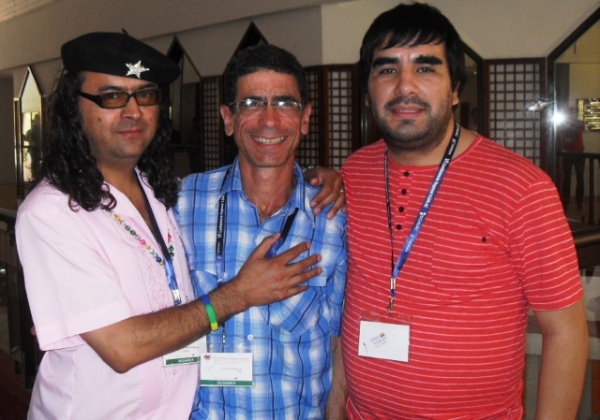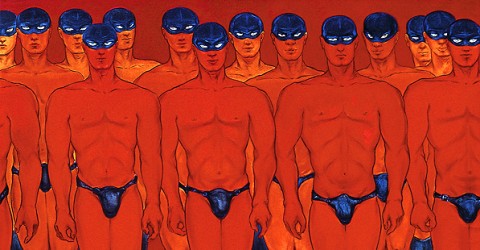Víctor Hugo Robles, el Che de los Gays, tomó venganza de la entrevista que le hice, y acaba de publicar una a mí, en cuya introducción yo creo que exagera, como suelen hacer los buenos amigos. No obstante, la reproduzco aquí también, porque de alguna manera sus preguntas me motivaron y ayudaron a repasar y resumir algunas de las ideas que me parecieron más importantes sobre la repercusión de la VII Jornada Cubana contra la Homofobia y la celebración en nuestro país de la VI Conferencia Regional de la Asociación Internacional de Lesbianas, Gays, Bisexuales, Trans e Intersex para América Latina y el Caribe.

Con Víctor Hugo y Darío Arias, joven activista argentino de quien también aprendí mucho durante la VI Conferencia Regional de ILGALAC.
Le agradezco a Víctor Hugo por su irreverencia alegre y cómplice, por la posibilidad que tuvimos de compartir en Varadero y La Habana, y estrechar así una camaradería que ya ambos presentíamos desde nuestro mutuo reconocimiento en la distancia, a través del contacto en las redes sociales, pero que ahora pudimos confirmar y afianzar en varios lances políticamente divertidos y polémicos que pudimos vivir juntos en Cuba.
Hasta la la próxima aventura, Che de los Gays…
Aquí la entrevista que me hizo:
Paquito el de Cuba: “Los activistas estamos para sacudir los pensamientos”
27. may, 2014
Francisco Rodríguez Cruz es periodista, militante comunista y activista de la diversidad sexual en Cuba. Siempre comprometido con las luchas políticas de América Latina y el Caribe, conocí de su valiente y positiva existencia a través de las redes sociales. Se presenta como Paquito el de Cuba y utiliza todas las formas de lucha para expresar su lúcido parecer. Su mirada aguda y enfoque siempre fresco de la Revolución Cubana hacen de su compromiso social un sitio de consulta e interés político – cultural que sobrepasa su público, debatido y visitado blog: www.paquitoeldecuba.com
Somos amigos y compañeros de ruta. En ese revoltoso caminar vivimos inolvidables momentos en la VI Conferencia Regional de ILGALAC en Varadero y la VII Jornada Cubana contra la Homofobia en La Habana, logrando intercambiar sinceros afectos, diversos saberes y deseos de loca revolución. Yo arribé a Cuba representando al Movimiento por la Diversidad Sexual MUMS de Chile, mientras nuestro querido Paquito lo hacía desde el colectivo Humanidad por la Diversidad, grupo comunitario que trabaja en redes con el Centro Nacional de Educación Sexual de Cuba CENESEX, comprometida entidad dirigida por Mariela Castro Espín.
Mirando el hermoso malecón habanero, cansados, pero contentos de participar con nuestra lucha a lo que hemos llamado “Revolución en la Revolución”, dialogamos con Paquito sobre los eventos acontecidos en Cuba 2014.
Ya concluidas la Conferencia Regional de ILGALAC y la Jornada Cubana contra la Homofobia; ¿Qué evaluación podrías aventurar?
De la Conferencia Regional de ILGALAC puedo decir que me resultó muy interesante aprender de los mecanismos de trabajo de ILGALAC, que no los conocía, ponerme en contacto con activistas de todo el continente, conocer el trabajo interesantísimo en otras esferas y aprender de otras realidades, que a veces son diferentes, pero que tienen muchos puntos en común con los problemas que tenemos en Cuba y en la sociedad cubana en el tema de homofobia y discriminación por distintos motivos. Yo creo que a los activistas cubanos nos hacía falta ese contacto, ese aprendizaje válido, porque muchas veces uno tiende a sobredimensionar los problemas que conoce, que son los que tiene a su alrededor y a veces no percibe que hay otras personas que están -incluso- en peores situaciones. En ese sentido, creo que fue muy importante e interesante que se hiciera la Conferencia Regional de ILGALAC en Cuba.
En cuanto a la Jornada Cubana contra la Homofobia en La Habana me pareció útil e importante el panel de familias porque es un espacio de participación donde la gente puede escuchar, dialogar y aprender sobre estos temas, no solo de la experiencia de Cuba, sino de otras experiencias. Me pareció importante también la participación de la comunidad LGTBI de Cuba y su conocimiento de encontrarse con otros colegas de todos los países de América Latina. Fue increíble esa experiencia. Hubo otro asunto, un poco más profesional, que es el panel que tuvimos en el Pabellón Cuba sobre las experiencias de comunicación de la sociedad civil y las instituciones cubanas. Resultó muy rico el debate, particularmente los aportes que se hicieron desde el público, un poco precisando lo que hemos hecho, pero también lo que nos falta por hacer en materia de comunicación sobre el tema de la diversidad sexual, la discriminación por orientación sexual e identidades de género.
En la reunión de ILGALAC participaron activistas y organizaciones locales vinculadas a Cenesex, excepto el Proyecto Arcoíris, un grupo crítico e independiente que trabaja las temáticas de la diversidad sexual desde una mirada anticapitalista. En contraste, hubo otros grupos abiertamente disidentes del trabajo comunitario de Cenesex que tildaron de “teatro” a la Conferencia Regional de ILGALAC. ¿Cómo enfrentas esa crítica desde tu trabajo activista comunitario?
Es una crítica, como otras tantas, intrascendente, porque en realidad todo el mundo estaba en igualdad de condiciones para participar si tenían los recursos para hacerlo. Fue un tema polémico, pero era una conferencia que no organizaba Cuba, el país era sólo el anfitrión, más bien era una Conferencia Internacional con sus estándares de participación e inscripción. En ella estuvo el Proyecto Arcoíris, que no está asociado con el Centro Nacional de Educación Sexual, Cenesex, junto a otro grupo de organizaciones de las redes comunitarias. Todo el mundo se expresó y participó abiertamente. Yo preguntaría a estas personas, porque son más personas que organizaciones; ¿Qué hicieron para intentar participar? Tal vez no consiguieron financiamiento desde la Oficina de Intereses de los Estados Unidos en Cuba. Todo aquel que se inscribió pudo participar. Hay una conducta que es la norma en este tipo de personas que es negar a priori cualquier intento de entendimiento o de diálogo o de comprensión de lo que se ha organizado desde posiciones que defienden a la Revolución Cubana.
La carta final de la reunión, la declaración, la Carta de Cuba, fue explícita y crítica frente a las injusticias en el continente y de situaciones diversas que ocurren en Argentina y Venezuela. Respecto de Cuba se manifestó abiertamente en contra del bloqueo norteamericano, exigiendo además la liberación de los cinco presos cubanos que están en Estados Unidos. ¿Esperabas ese apoyo y complicidad de las organizaciones activistas de la diversidad sexual de América Latina y el Caribe solidarizando con Cuba y su Revolución?
Fue increíble, me sorprendió el nivel de claridad y de radicalización de los planteamientos que se dieron durante el proceso de elaboración de la carta de Cuba, en la cual participé además. Fuimos un pequeño grupo comisionado para redactarla y ahí dimos muchas ideas que fueron enriquecidas, presentadas y ampliadas enormemente en el propio plenario. Hubo que después correr literalmente a incorporar los aportes que hicieron las delegadas y los delegados de ILGALAC que trascendieron las expectativas del propio comité que la elaboró. Creo que eso fue particularmente importante porque se logró un documento con un nivel de posicionamiento desde el punto de vista de las ideas más progresistas del continente. Ya quisieran muchas organizaciones o reuniones o eventos y hasta cumbres conseguir esa calidad en los pronunciamientos.
En la conga contra la homofobia, nosotros en Chile le llamamos marcha, participaron por primera vez muchos activistas del mundo que vinieron a Cuba a participar de ILGALAC. ¿Cómo viviste esa unidad latinoamericana en las calles de La Habana?
La Conga viene siendo una tradición en La Habana. Siempre hay mucha participación de personas que vienen de fuera de Cuba, no solo de países de América Latina y el Caribe, sino también de Europa e incluso de los propios Estados Unidos. Este año fue mayor porque estaban los delegados y delegadas de ILGALAC y eso ayudó a enriquecer la Conga. Yo creo que oxigena ver a tantas personas que comparten su causa en distintos lugares y también supongo que para las personas que nos visitan es esencial ver a la comunidad LGBTI cubana de la base ahí en este espacio, tan democrático, tan lúdico, tan divertido, pero también de pensamiento en donde se transmiten ideas que son esenciales para incidir políticamente los cambios que queremos lograr en la sociedad.
Finalmente; ¿alguna reflexión sobre la “performance” de “El Che de los Gays” en medio de la Conga de la Jornada Cubana contra la Homofobia portando la padigmática última imagen del Che Guevara muerto en Bolivia?
Una persona me comentó, supongo tiene posiciones críticas hacia la Revolución, que se le “faltaba el respeto” a la imagen del Che a partir de la performance con la foto del Che muerto. Mi respuesta fue: “Si supieras, que cuando “El Che de los Gays” explicó en un discurso político y emotivo a las personas que participaron en la Conga, aplaudieron delirantemente y terminó siendo un acto de reafirmación revolucionaria que era lo que se perseguía en definitiva y eso a partir de símbolos e imágenes que a veces también las esquematizamos y las estereotipamos”. Yo creo que la acción llamó a la reflexión sobre realidades de nuestros tiempos que no eran, quizás, la de los tiempos, de otras generaciones, pero que se puede recontextualizar a favor de lo que queremos lograr ahora. Me parece que fue útil porque, en definitiva, para eso estamos los activistas, para sacudir el pensamiento, para sacudir la sensibilidad de las personas y que la gente se pregunte por qué se hace esto o por qué se hace aquello. Es importante estremecer la conciencia de la gente y creo que la performance de “El Che de los Gays” contribuyó a que nos preguntáramos por la vigencia e importancia del Che en las luchas por combatir la homofobia desde todos los ángulos y desde todos los puntos de vista políticos, estéticos e ideológicos.
Por Víctor Hugo Robles
Activista Comunicaciones MUMS


